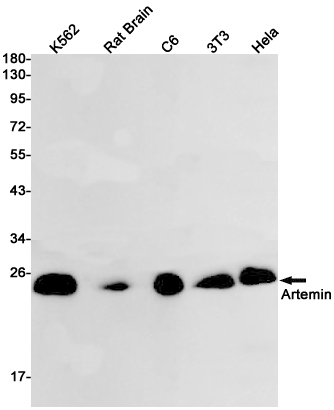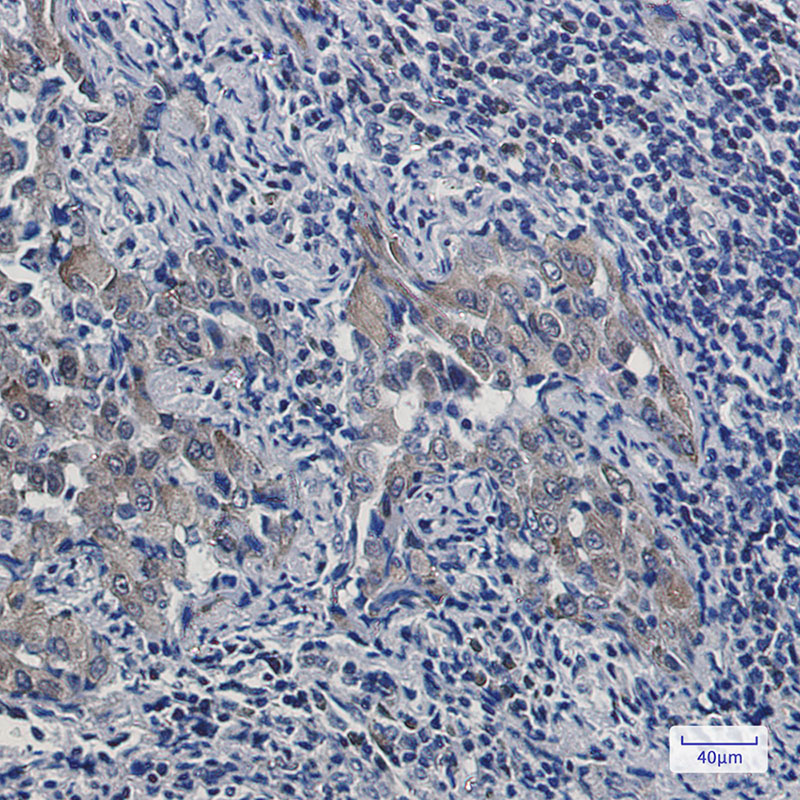

| WB | 咨询技术 | Human,Mouse,Rat |
| IF | 1/20 | Human,Mouse,Rat |
| IHC | 1/50-1/100 | Human,Mouse,Rat |
| ICC | 技术咨询 | Human,Mouse,Rat |
| FCM | 咨询技术 | Human,Mouse,Rat |
| Elisa | 咨询技术 | Human,Mouse,Rat |
| Aliases | Enovin; Neublastin |
| Entrez GeneID | 9048 |
| WB Predicted band size | Calculated MW: 23 kDa; Observed MW: 23 kDa |
| Host/Isotype | Rabbit IgG |
| Antibody Type | Primary antibody |
| Storage | Store at 4°C short term. Aliquot and store at -20°C long term. Avoid freeze/thaw cycles. |
| Species Reactivity | Human,Mouse,Rat |
| Immunogen | A synthetic peptide of human Artemin |
| Formulation | Purified antibody in TBS with 0.05% sodium azide,0.05%BSA and 50% glycerol. |
+ +
以下是关于Artemin抗体的3篇代表性文献,简要总结其研究内容:
1. **"Artemin promotes functional long-distance axonal regeneration to the brainstem after dorsal root crush"**
- **作者**:Bennett DL 等
- **摘要**:研究通过使用抗Artemin抗体阻断实验,证实Artemin在促进背根神经节神经元轴突再生中的作用,揭示其在神经修复中的潜在治疗价值。
2. **"Artemin is a vascular-derived neurotropic factor for developing sympathetic neurons"**
- **作者**:Honma Y 等
- **摘要**:利用Artemin特异性抗体进行免疫组化和中和实验,发现Artemin由血管内皮细胞分泌,对交感神经元的存活和靶向迁移至关重要。
3. **"Antibody-mediated neutralization of Artemin suppresses inflammatory pain in mice"**
- **作者**:Elitt CM 等
- **摘要**:开发并验证了一种中和性抗Artemin抗体,证明其通过抑制Artemin与受体GFRα3结合,有效缓解小鼠炎性疼痛模型中的痛觉过敏。
4. **"Artemin/GFRα3 signaling regulates nociceptive sensory neuron connectivity"**
- **作者**:Malin SA 等
- **摘要**:通过免疫荧光和抗体阻断技术,发现Artemin信号通路调控伤害性感觉神经元的靶向支配,影响痛觉传递的神经环路形成。
这些研究均涉及Artemin抗体的实验应用,涵盖神经发育、疾病机制及治疗探索等领域。
Artemin (ARTN), a member of the glial cell line-derived neurotrophic factor (GDNF) family, plays a critical role in neuronal development, survival, and maintenance. It binds to the GDNF family receptor alpha-3 (GFRα3) and activates the RET tyrosine kinase receptor, triggering downstream signaling pathways like PI3K/AKT and MAPK. These pathways support neuron survival, axon guidance, and synaptic plasticity, particularly in sensory and sympathetic neurons. Artemin is also implicated in pathological conditions, including cancer progression and neuropathic pain, where its overexpression in tumors (e.g., breast, pancreatic) correlates with metastasis and therapy resistance.
Artemin antibodies are tools designed to detect, quantify, or inhibit ARTN activity. Monoclonal or polyclonal variants are used in research to study ARTN's biological roles via techniques like Western blot, immunohistochemistry, or ELISA. Neutralizing antibodies, which block ARTN-GFRα3 interaction, help explore its functional contributions to diseases and may have therapeutic potential. For instance, inhibiting ARTN in preclinical models reduces pain hypersensitivity and cancer cell invasiveness. However, therapeutic applications remain experimental, requiring further validation of efficacy and safety. Overall, Artemin antibodies are vital for elucidating ARTN's dual roles in neural health and disease, offering insights for novel treatment strategies.
×